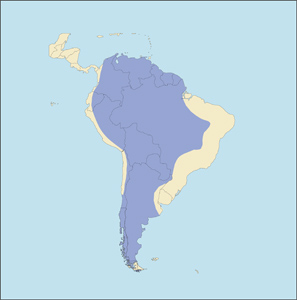 |
Puma concolor
Puma (Sp), Puma (G), Puma (F). Concolor, which is Latin for "of the same color," is in reference to its plain coloration. Called puma throughout South America, the name cougar being used only in Canada and the United States. Called léon locally.
DESCRIPTION (male) South American pumas are 6-7 feet (1.8 to 2.1 m) in length, including 26-32 inches (66-81 cm) of tail. Shoulder height 25-28 inches (64-71 cm). Weight about 120 pounds (55 kg). The female is roughly two-thirds the size of the male. As with most mammals (but unlike jaguars), the smallest pumas are found near the equator, increasing in size to the north and south.
The puma is the second largest cat in the Western Hemisphere. South American specimens are somewhat smaller and lighter in color than those in North America, and are considerably smaller than South American jaguars. They are long and slim, with
a long muscular neck and a remarkably small head for such
a large cat. The tail is long and cylindrical. The color ranges from buff to tawny, with the underparts white.
BEHAVIOR Solitary, seeking company only during the brief courtship period. Males are territorial, actively maintaining and marking their home ranges. There is no fixed breeding season. The female usually has a litter of 1-6 kittens every other year, and they remain with her for about two years. Life expectancy is 12 years, but captives have lived as long as 19 years.
Entirely carnivorous, pumas usually kill by stalking to close range, then leaping onto the prey animal's neck or shoulders with one or more bounds. Sometimes they kill domestic animals, which has made them unpopular with ranchers and has led to their persecution. Although large in size, the puma is classified as a "lesser" cat because of its inability to roar. It can purr, and may hiss and snarl when cornered; however, it usually is silent. Rarely, during the mating season, the female may emit a blood-curdling scream. Eyesight is excellent, hearing and sense of smell are good. Largely nocturnal, shy, alert and elusive, it is seldom seen by humans. Usually unaggressive toward humans, but attacks do occur.
HABITAT Can live anyplace there is adequate cover and prey, including mountains, savannas, jungles and dry bush. Has been recorded as high as l5,000 feet (4,600 m) in the Andes.
DISTRIBUTION Most of South America.
Also occurs in most of western North America. Has the most extensive natural distribution of any wild mammal in the Western Hemisphere.
TAXONOMIC NOTES A number of subspecies have been described, but with only minor differences. We do not separate them.
|





